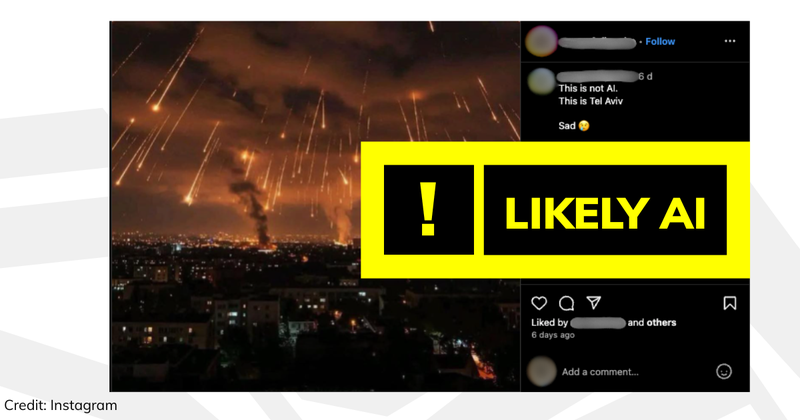What was claimed
A photo shows missiles in the sky above Tel Aviv last week amid strikes between Israel and Iran.
Our verdict
This image was almost certainly created with artificial intelligence. There’s no evidence to suggest it’s real.
What was claimed
A photo shows missiles in the sky above Tel Aviv last week amid strikes between Israel and Iran.
Our verdict
This image was almost certainly created with artificial intelligence. There’s no evidence to suggest it’s real.
An image of the night sky above a city illuminated by missiles is being widely shared on social media with claims it shows scenes in Tel Aviv, Israel, last week, amid conflict between Israel and Iran.
The image shows missiles raining down on an urban landscape with columns of smoke rising from buildings in the distance. A post sharing the image on X with the caption “This is not AI. This is Tel Aviv” has over 18,000 shares.
But, contrary to the claim in the caption, this image was almost certainly created with AI, and we could find no evidence that it's real.

It appears to have been first shared on Facebook and Instagram by the digital creator Mhamad Yusif. This name appears as a watermark at the top and bottom of the full image, though it has been cropped out of versions of the image shared with the claim it’s real.
Mr Yusif has also shared what appears to be the prompt given to the artificial intelligence model to generate the image.
In a comment on his Facebook post, he wrote in quotation marks: “‘A highly detailed cinematic wide shot of glowing fiery trails falling from the sky over a modern city at night. The light trails resemble meteor showers or celestial phenomena, illuminating the cloudy sky in hues of orange and red. Below, the cityscape shows buildings with lights on, some faint smoke rising between them, adding a sense of tension and mystery. The style is ultra-realistic with dramatic lighting and a moody atmosphere, resembling a scene from a high-budget disaster or sci-fi movie.’”
Full Fact has contacted Mr Yusif for comment and will update this article if we receive a response.
Join 72,953 people who trust us to check the facts
Sign up to get weekly updates on politics, immigration, health and more.
Subscribe to weekly email newsletters from Full Fact for updates on politics, immigration, health and more. Our fact checks are free to read but not to produce, so you will also get occasional emails about fundraising and other ways you can help. You can unsubscribe at any time. For more information about how we use your data see our Privacy Policy.
Another clue that this image is almost certainly AI-generated comes from Google. When Full Fact put the picture into Google reverse image search, it told us this image was “made with Google AI”.
Google’s reverse image search tool did not provide further details, so we can’t say for sure what that’s based on. But a page explaining how Google finds information about an image says “some images may contain data that shows if they were generated with AI”, such as a SynthID.
A SynthID is a digital watermark that is undetectable with the human eye, but is embedded into content made with several Google AI products. The watermark remains detectable despite any changes made to the quality or size of the picture.
We’ve previously written about another image that was identified as “made with Google AI”. A Google spokesperson told us at the time that a SynthID watermark had been detected in the image, and that this meant the image had been “generated or modified with AI”, though they said it was “not possible to confirm how or to what degree AI was used to generate or modify the image”.
We’ve not seen any other evidence to suggest that the image supposedly showing Tel Aviv is real—for example, we have not seen examples of it being shared before Mr Yusif’s posts, and we have not seen it credited to a different source or published by credible media outlets.
Genuine footage shared by the BBC has captured missiles and explosions in Tel Aviv in recent days. Israel and Iran have launched multiple strikes against each other following an Israeli attack on Iranian nuclear infrastructure and other targets on 13 June. A ceasefire was announced on Tuesday (24 June) but at the time of writing it was unclear if it would hold.
We’ve written a round-up of the misinformation we’ve seen relating to the recent conflict, including other examples of content which is almost certainly AI-generated being shared as if it’s genuine. It’s important to verify what you see online—our guide to spotting if something is AI can help you to do this.
This article is part of our work fact checking potentially false pictures, videos and stories on Facebook. You can read more about this—and find out how to report Facebook content—here. For the purposes of that scheme, we’ve rated this claim as altered because this image was almost certainly created with artificial intelligence and there’s no evidence to suggest it’s real.
Full Fact fights for good, reliable information in the media, online, and in politics.
Bad information ruins lives. It promotes hate, damages people’s health, and hurts democracy. You deserve better.
Subscribe to weekly email newsletters from Full Fact for updates on politics, immigration, health and more. Our fact checks are free to read but not to produce, so you will also get occasional emails about fundraising and other ways you can help. You can unsubscribe at any time. For more information about how we use your data see our Privacy Policy.